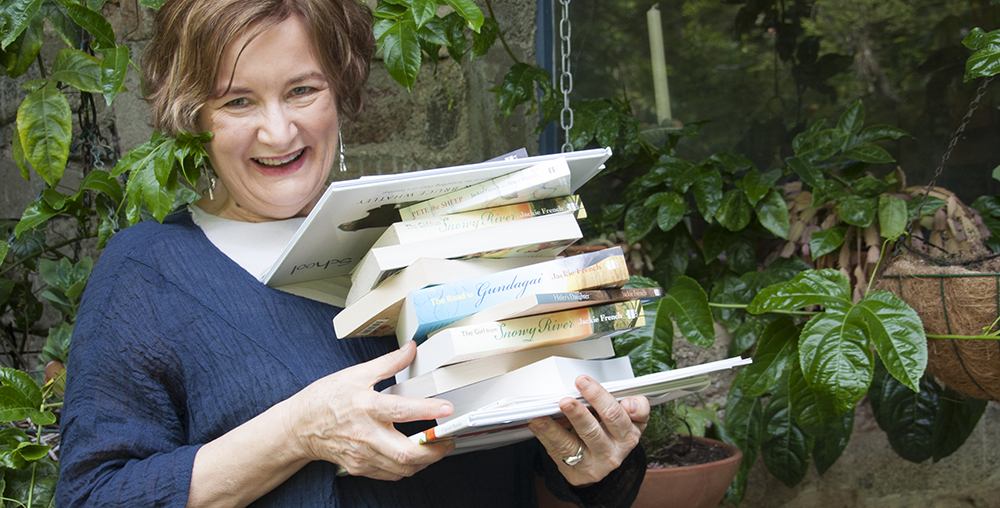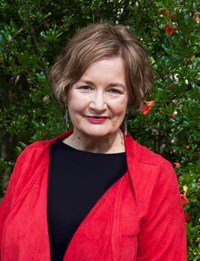Issue 97
Term 2 2016
1,000 reasons to support Australian book creators
Acclaimed author Jackie French provides insight into the life of children's writers: responding to children's letters, creating teaching notes, and devoting their life to writing. Jackie discusses how libraries facilitate the relationship between the reader and the writer, and how school library staff can help to aid in the growth of the Australian writing industry.

Dear Jackie French,
What I have learned from your book is to be wary of anyone who tries to make you angry.
Love James
James was 14, and Hitler’s Daughter was the first book he had ever read. Yet he had found the truth behind a question I had been hunting for ever since I was ten years old: how did Hitler convince most of Europe that killing over 44 million people was reasonable, from those shipped to concentration camps to prisoners who had surrendered?
It is a joy and a privilege to receive letters from children. It also takes at least a day — sometimes up to two weeks — to answer them, plus stationery and postage costs, and the odd hour of anguish worrying about their problems.
But there are royalties from the books to compensate for this time, aren’t there? Except, of course, if your books are read in libraries — and when your readers are children, most of the books they read are likely to be from their school library.
How long does a book last in a school library? I’ve signed twenty-year-old copies of Rainstones, repaired with dedication at least fifty times and still in currency despite having been read by perhaps over 1,000 children — not all of whom wrote to me in the manila envelopes writers both love and dread.
Dear Jackie French,
I have to write a story and I don’t know where to start. Can you give me some ideas?
But can a book be measured in dollars? Every book a child reads creates new neurons in their brain. Empathy is learned, and each book teaches them to understand others — and themselves. If we want our children to create machines to mine asteroids or design ways to cure our wobbly knees, we give them books.
Make sure to give them great books: hilarious books, enthralling books, or deeply insightful books, because ‘boring books’ turn kids into anti-readers. It is easy to write a book: nearly every parent creates stories for their children. But the ‘magic book’ that tempts those children into being true readers is rare. Yes, you’ll find bestsellers by part-time authors, but think about the books written for young people that you truly treasure. I bet they have been written by those who have devoted their lives to writing — and to children.
Dear Jackie French,
I read I am Juliet. Then I read Romeo and Juliet. Shakespeare’s words were funny at first, but then I heard the music.
Matilda.
Which brings me to those tattered copies, the ones lugged to book signings by teachers and librarians who are as devoted to providing books to children as authors are. If a book costs $15, then the author will receive five per cent, i.e. 75 cents, which is about the cost of responding to one child’s letter. If that library book was bought from a book club at a discounted price, then the author might receive only five cents — or, increasingly, nothing at all if the book was bought online from overseas, either from remaindered stock or cheaply printed by someone who doesn’t pay royalties to writers.
Libraries are filled with child gold, riches for their lives and imagination, tempters to read more and more. Ephemeral bestsellers, like movie tie-ins, rarely last in libraries. This means the best books are those where one copy may be read by 1,000 children, for 75 cents or less.
Or, at least, this would be the case if it weren’t for the Educational Lending Right (ELR), the children’s authors’ life-saver. With ELR, eligible creators are paid by the Australian federal government for each copy in a school library [1]. It’s the way that most children’s authors manage to buy their coffee and muesli, pay their mortgage — and keep creating books.
Please, for the sake of every children’s book author you admire, for every children’s book you love, and for every child who needs inspiration: join the ELR surveys if you are given the chance so that we can keep on writing, creating teaching notes . . . and answering those emails and letters.
Dear Jackie French,
Our teacher said we had to write to our favorite author. My favorite author is Roald Dahl. He’s dead so I’m writing to you. What is your favourite colour? What kind of car do you drive? How many brothers and sisters do you have?
Love Michael.
If you would like to arrange a free speakerphone discussion with Jackie French regarding her books or writing, please contact: Holly Frendo, Publicity Manager | HarperCollins Publishers Australia Email: [email protected]
[1] Estimated through an annual, national survey of school libraries. Eligible creators will receive an annual payment if their estimated book count is 50 books or more, and the payment is $100 or more.
